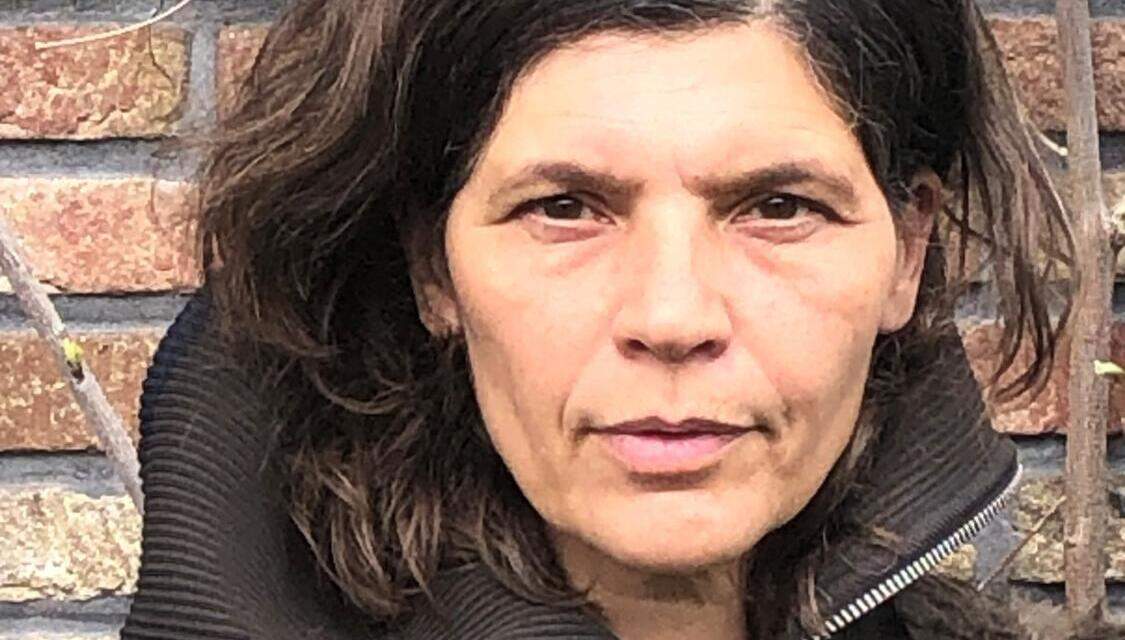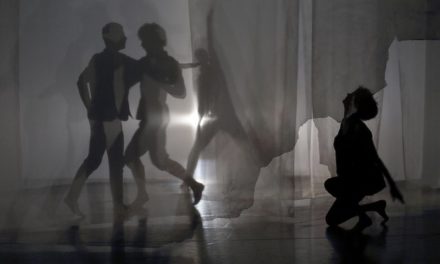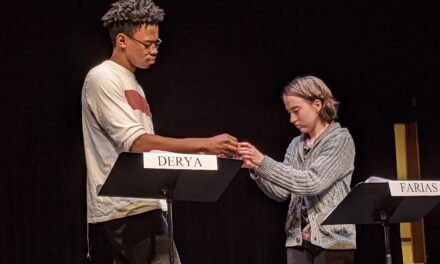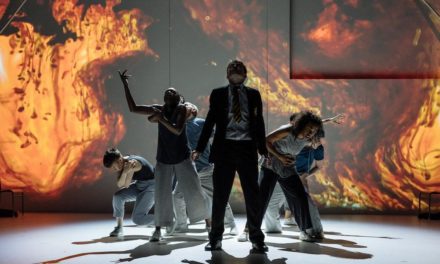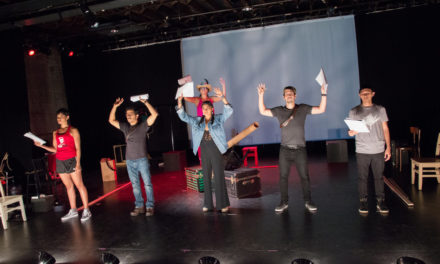Paulien Geerlings is the head dramaturg at Amsterdam’s The Toneelmakerij, a theatre company devoted to children and teens. Currently, she serves as the artistic lead of Young Europe IV. Young Europe IV is a 3-year programme focused on young audiences and the non-dominant voices in our societies and their stories. Young Europe IV is the winner of a 50,000 EUR prize and the Art Explora – Académie des Beaux-Arts European Award 2022.
Kasia Lech: To what extent does your personal and professional interest in the Project, as a dramaturg, grow out of observations in The Netherlands, or from some other European observation?
Paulien Geerlings: It’s very personal, because I have a migration background myself. I grew up in the Netherlands as a Dutch girl, but I have an Indonesian background. My father fled with his family from Indonesia. So I think [that’s] broadened my perspective and my interest and somehow my passion for marginalized voices. And then, I work in a youth theatre company: children are themselves already marginalized, so that is where my engagement with children comes from. I think children, they live in the same world we do, and I don’t believe youth and childhood’s always simple. Very complex lives, children can have already. Our audience is very diverse: 50% of our performances, we play for schools. The school audiences, they are all layers of society, and all backgrounds. I think it’s very important that we connect to this audience. I mean, we make high-quality artistic productions, but we have our audience in mind when we start conceptualizing. From the very first moment, we know what our audience will be. [That’s] something I think adult theatre should be much more aware of, as well, because when you’re only telling your own white, high-educated stories, you’re missing out on a lot of potential audience. “I’m only busy with what I want to tell,” then you are creating for the 3% high-educated, white audience. I think Youth Theatre is ahead of that. You want to have a cast that is diverse in the broadest sense, all types of people onstage, so that all these children identify with them. And then, of course, also, the stories, and from which perspective you tell your stories. I think theatre is a beautiful medium for that, because it can be multiply-voiced within one play, different characters, different perspectives.
KL: I think that’s the practice that happens a lot. Within youth theatre, the children’s actual voices are often marginalized, as well. When you say you have your audience in mind, how do you know your audience? How do you engage with them?
PG: Most of the time, we have [the children] quite early within our creation process. Because, actually, I cannot make theatre as a child, I make theatre from my perspective, and I can only create things I like myself, and sometimes it’s very hard to know if a certain play is too difficult or not for a certain age group. I still find it very hard. Most of the time, you underestimate what they can relate to. So, then, for example, we work a lot with new writing, so we go and test it out: we go into a classroom, we read the play of the moment, and we see how it connects. Or we have a group of children that follow our rehearsal process. Or we ask a group of children to come at certain times to give feedback on what they see.
KL: So, are the perspectives of the creative team diversified, or mostly Dutch?
PG: We have to broaden that, as well, in the artistic team.
KL: That’s incredibly difficult, of course, because there’s the whole structure of the system and landscape.
PG: Yeah, that’s an ongoing thing.
KL: Well, I think it’s one of those tasks that never ends, isn’t it? It’s a commitment that you make every day. So how did that, then, lead into the project with European Theatre Convention, marginalized European voices, the non-dominant European voices?
PG: I conceptualized this project when we were in lockdown, as I had to think of [something] we could do. Because we do a lot with new writing, and I had done, in the past, a project with the European Writers’ Lab, I thought, okay, that is very nice. And I also have a passion for the classroom. We make performances for the classroom, with two actors, often a new text, with a workshop afterwards, very highly engaged, urgent productions, which are very dear to me. But yeah, it had to do with a lot of things. We always want to create a kind of festival in the end, and then it’s also very good to focus on classroom productions, because if you want them to travel, it’s easier in the end.
KL: And you reach children.
PG: They’re the best audience you can get, because, in the schools, again, you’ll find all the layers of society. So, yeah, that was why I thought it would be interesting to do.
KL: So, since October, what work has been done?
PG: We had already had quite some meetings before, with the artistic teams of the theatres who were involved, and, of course, most of these big houses are quite white, but with a big wish to diversify. We had a lot of discussions, because diversity, within a very diverse Europe, means something different to everybody. We had to find common ground, somehow, to get a profile: what kind of playwright are we looking for, what kind of mentors, what does it mean in your country, and so on. That was a lot of work, actually, to do that, because it is so different. And people are in different stages of being aware of your own bias, of your own privilege.
KL: I’d love to unpack that a little bit.
PG: So, for example, in Malta, the Maltese language is marginalized—
KL: Yeah, Irish, too.
PG: Yeah. I mean, I would not have thought about that. In Slovenia, there is much more in the LGBTQI community: the dramaturg youth worker there said that she got a lot of youngsters coming to her to talk about these issues. So, that is a very urgent topic in Slovenia. And then in Bratislava, they said that there were not that many women playwrights. And you get interesting talks about racism in the south of Europe. People can say, “Oh, but that’s a northern European problem, because you had the colonies…”, but, of course, that makes our societies very different.
KL: What about the question of language? Because when I think about who is represented, you will see visual diversity on British mainstream stages more and more, but you will not hear diversity, unless it’s within a sort of normative English accent. How do you even widen that marginalization?
PG: Yeah. That is a complex thing, as well, to think about. It’s not always clear what is dominant and what is non-dominant. Sometimes, you think you see something, but it’s a totally different story, what is behind there.
KL: So to what extent is that question of language on your mind?
PG: It’s not a general issue that we discussed. I have had experience with a Dutch-Syrian playwright who was writing, in Dutch, a play for us, and then at a certain point, I [thought,] okay, should I correct the Dutch, or should we keep it like his own language? And then we decided to do the last, because it felt violating to make it in correct Dutch. I am now, in this project, working with a playwright who has Israeli background, and sometimes, you think, ah, this is a weird kind of sentence, but it’s Hebrew that he—
KL: It’s the code-switching and translanguages, yeah.
PG: It makes someone’s language. I try to keep it when a playwright is offering that.
KL: That’s amazing. What are the other challenges from a dramaturgical perspective?
PG: Well, I found it very important to have us mentors. A part of this project, apart from the in-house dramaturgs, is to have mentors who themselves have migration background. So, for example, Tomer [Pawlicki], our playwright, is writing a play about a friendship between an Israeli boy and an Islamic boy. He wants to write a play about how the conflict in the Middle East has an effect on their friendship, and how they get back together again. For me, it’s very important to have another dramaturg, or a mentor, who can, on another level, discuss this issue with Tomer. So I’m very happy that we have this German-Syrian mentor [Mohammad Al Attar]. And I think it’s also important to have these different languages onstage. I think, especially, for a lot of children who speak two or three languages. The only thing that we never try to do is slang, because we are always outdated.
KL: Yes! So, what is next for this project?
PG: Next… I know you were also asking what we had done before the kickoff. We had also done a kind of physical kickoff in Prague already. So, we met with the whole group, all the playwrights, mentors, theatres, and we also had a diversity workshop, to find this common ground. And we had a masterclass on writing for the classroom, things like that. And now, what is next is that everyone is in the phase of writing, and then we will meet in Braunschweig. What is so great about getting this award is now we have money to meet again in the midterm, otherwise we would have only seen each other at the end, and now we have a midterm meeting in Braunschweig, where we can share the work, where we will have another masterclass, and, also, I think some kind of workshop on before- and aftercare for the performance, because it’s embedded. Then all the productions will be staged in their own countries, and then we will all, in ’24, bring the productions to Nova Gorica, where we have the Young Europe IV Festival, thanks to the money from the prize, and then we can also make a nice symposium around it, and make it into a real festival.
KL: So, in terms of European theatre and Europe itself, what is the significance of the project? Why do you think this project is important?
PG: Where to start? I think, yeah, in European theatre, I just have written what is the status of women playwrights and women characters on Dutch stages, and this is very shocking, in a way. We have really been counting, and I think most of the European theatrical canon, it’s the white, male, heterosexual gaze. And I think that is the importance of this project, to enlarge that, to broaden that, and to get other perspectives.
KL: Why?
PG: Because we know all about the fear and the shame and the passions of white men, but that is not everything there is. There are other stories that are very worth telling.
Young Europe IV runs from 2021-2024 and is hosted by the European Theatre Convention. The project’s focus is within the expansion of European canon, by highlighting and advocating for “forgotten” stories and marginalized voices. The aforementioned classroom plays are currently being performed at participating theatres, and will be produced at the Young Europe IV festival in 2024.
To learn more about the project, click here.
This post was written by the author in their personal capacity.The opinions expressed in this article are the author’s own and do not reflect the view of The Theatre Times, their staff or collaborators.
This post was written by Rhiannon Ling and Kasia Lech.
The views expressed here belong to the author and do not necessarily reflect our views and opinions.

